Rojava, consisting of the three autonomous self-governing cantons Afrin, Kobane, and Cizire, with a mainly Kurdish population, is threatened not only by IS (Islamic State) and Turkey. The USA and most European countries show no sympathy for the plight of the population and have forsaken the Kurdish and Christian self-defense units of Rojava.
Why is Rojava disliked, why limit the USA their air strikes around Kobane, although IS tanks and artillery are easily to detect? Why can Turkish President Erdogan uncontested call the self-defense units YPG and YPJ terrorists, who will not be supported by Turkey?
Erdogan: “We will never tolerate any terrorist organization in our country, in our region or in the world. We are open and ready for any cooperation in the fight against terrorism. But everyone should understand that Turkey is not a country that pursues temporary solutions, and Turkey will not tolerate that others benefit from it!”
Turkey uses the current situation in Kobane to pursue a buffer zone on Syrian soil, protected by Turkish soldiers, which in fact would be equivalent to the occupation of Kurdish areas in Syria.
President Erdogan declared that he sees no difference between PKK and IS.
Rojava has many foes
Turkey: The example of Rojava is not liked, because it may be the blueprint of a federal Turkey with Kurdish autonomy and it challenges the existing central government.
USA: Because Rojava cannot be used against Bashar Al-Assad, the United States are not interested to support it.
Northern Iraq: The autonomous Kurdish province in northern Iraq under the rule of tribal leader Barzani boycotts Rojava because the conservative and autocratic Barzani clan has no interest in a democratic model in its neighborhood.
Most of the regional neighbors are against Rojava because the Arab states have a patriarchal society and emancipatory movements are undesirable and viewed as a threat to the social fabric.
The following text explains the model Rojava with its political structure and objectives and also tries to make clear, why this democratic experiment is not supported by anyone except to a limited extent the Syrian government.
Model Rojava
Rojava, the Kurdish word for “west,” stands for West Kurdistan. For centuries the region offered a unique cultural, ethnic, and religious diversity: Kurds, Arabs, Turkmens, and Armenians lived peacefully together. Syriacs / Assyrians, Chaldeans, Yezidis, and Muslims practiced their faith without discriminating each other.
This social harmony could end by new from outside incited sectarian division.
At the moment 3.6 million people inhabit this region, including 1.2 million refugees (mainly internal displaced people from Syria and Yezidis from Iraq).
Rojava is an experiment of a direct local democracy. The patriarchal clan society, characterized by authoritarian control, obedience, and unquestioning loyalty, is replaced by grassroots structures involving all ethnic and religious minorities, and by the equal participation of women in all political and social institutions.
A new health system with health centers has been established and an education system is emerging, where in addition to Arabic and Kurdish also Aramaic is taught. The first Kurdish university was opened in August 2014 in Qamisli. Organic farming cooperatives and a grass roots democratic legal system have been established.
Rojava exists since 2012 and the political and social organization is based on Abdullah Ocalan’s ideas of a “democratic confederalism.” Ocalan, since 1999 held in captivity on the prison island of Imrali in the Sea of Marmara, turned away from Marxist-Leninist revolutionary theories of revolution and embraced the vision of a democratic, ecological, and gender-liberated society. He was mainly inspired by the American libertarian theorist Murray Bookchin.
Excerpts from Ocalan’s text “Democratic Confederalism:
This form of administration can be described as a non-governmental administration or a democracy without the central state. Democratic decision-making processes are not to be confused with the usual processes of a public administration. States administer only, however, democracies govern. States are based on power, democracies are based on collective consensus. State officials are appointed, even if they are partially legitimized by elections, while democracies cast officials by direct elections. The state uses coercion as a legitimate means, democracies are based on voluntary participation.
Democratic confederalism is open to other political groups and factions. It is flexible, multicultural, anti-monopolistic and consensus-oriented. Ecology and feminism are central pillars of society. Under this type of self-government an alternative economic system is required, building and increasing the natural resources rather than unsustainably exploiting them, and thereby meeting the diverse needs of society.
In contrast to a centralized bureaucratic view of administration and use of power, confederalism is a kind of political self-government in which all social groups and cultural identities participate in regional meetings, general meetings, and councils. This understanding of democracy opens the political space for all of society and takes into account the formation of various and diverse political groups. In this way, it promotes the political integration of society as a whole. Politic becomes a part of everyday life.
Democratic confederalism can be described as a kind of self-government, contrasting the administration of a nation state. Nevertheless, under certain circumstances, a peaceful coexistence is possible as long as the nation-state does not interfere in central issues of self-government. Any such interference would cause the self-defense of civil society. Democratic confederalism is not at war with any nation-state, but will be vigilant against assimilation efforts. A violent revolution or the founding of a new nation will not create sustainable change. In the long term freedom and justice can only be achieved within a dynamic democratic confederal process.
Democratic confederalism in Kurdistan is simultaneously an anti-nationalist movement. It aims for the self-determination of people through the expansion of democracy in all parts of Kurdistan, without questioning existing political boundaries. The goal is not the creation of a Kurdish nation state. The movement intends to establish federal structures in Iran, Turkey, Syria, and Iraq, in concurrence with the formation of an inter-confederation for all four parts of Kurdistan.
Cemil Bayik, a major PKK leader, in the Turkish daily “Radikal: ”It becomes clear that the Kurds by their demands for autonomy in principle want to achieve the same status as, for example, South Tyrol in Italy has … It must be understood that the PKK does not chase for a piece of land or a state. We do not even separate the Kurds from all other peoples of the region. We are concerned with the creation of a democratic society, based on the brotherhood of nations, where each group with their idiosyncrasies, their language, and their culture can organize itself freely and nevertheless be part of the whole.”
On July 19, 2012, the cornerstone was laid for the uprising of Rojavas population. They occupied initially a few state institutions. When the security forces wanted to quell the uprising, they soon realized that their situation was hopeless, because the population had surrounded them and started to overtake further administrative buildings.
Subsequently the government officials either left the cities or resigned and continued their lives as ordinary citicens.
On January 6, 2014, a social contract for Rojava was adopted in Qamishli and on January 18 a democratic autonomous self-government was proclaimed. Center of the social system is the municipality, similar to the Swiss cantonal Model.
There are gender quotes for decisions of local authorities and in all councils in Rojava at least 40 percent women must be involved in the discussions. In these councils current administrative issues, like for instance electricity and food supplies, but also social problems, like domestic violence and family disputes, are discussed and resolved if possible. There are special commissions which deal with social and political issues, like military defense, judicial questions, economic development, building cooperatives (bakeries, textile workshops, agricultural projects). Ecology commissions take care of waste disposal and habitat preservation.
Excerpts from Rojava Social Contract
Article 2:
a) The source of power is the population, the population rules. The administration is ensured by institutions and elections. All hierarchies, which are directed against the social contract of the democratic autonomous administration, are illegitimate.
b) The owner of the democratically created councils and executive bodies is the population. The monopolization by a group or class will not be tolerated.
Article 4:
The leadership of the democratically-autonomous administration in the cantons consists of: a) the Legislative Council, b) the Executive Council, c) the High Electoral Committee, d) the High Constitutional Court, e) the regional councils.
Article 8:
All cantons of the democratically-autonomous administration have the right to any regional activity as well as establishing their own government and councils, as long as they do not violate the social contract.
(This makes clear that Rojava, does not pursue a separate state like the Kurdish autonomous government of Barzani in northern Iraq, but wants to be part of a federal system in Syria)
Article 12:
The democratically-autonomous administration is a model for and will be part of a not centrally organized Syria. Federalism is the most appropriate system for Syria, and the relation between the autonomous administrations and the central government of Syria will be based on this model.
Article 15:
1) The people’s defense units (YPG YPJ) are a national institution responsible for the safety of all three cantons. They serve for the interests and security of the population. The YPG YPJ act according to the principle of self-defense. Their relationship to the army of the central government is determined by the laws of the Legislative Council.
2) The Asayiş forces are linked to the Commission of Homeland Security.
Article 23:
a) Everybody has the right to live his/her ethnic, linguistic, sexual, religious, and cultural identity.
b) Everybody has the right to live according to the principles of an ecological society.
Article 25:
a) The freedom of the individual is assured. No one may be arrested except by law.
b) The dignity of man is inviolable and must be protected. No one shall be subjected to physical or mental torture. Those who practice torture will be punished.
c) For detained and imprisoned persons human conditions have to be created. Prisons should not be places of punishment, but centers for education and rehabilitation.
Article 26:
a) The social contract guarantees the right to political activity and prohibits the death penalty.
Article 27:
a) Women have all political, social, economic, cultural rights, and the right to life. These rights are to be protected.
Article 28:
a) Women have the right to self-defense and the right to oppose and eradicate any gender discrimination.
Article 29:
a) The social contract guarantees the rights of children and prohibits child labor, physical and psychological torture of children, and child marriages.
Article 31:
a) The right to practice religion is guaranteed. Abusing religion for political purposes, sparking disputes over religion, and discriminating religious opponents will not be tolerated.
Article 39:
All mineral resources and natural resources belong to the society as a whole. Their exploitation, processing, and use is regulated by law.
Article 40:
In the democratically-autonomous administrations any property and land is owned by the population. Use and distribution are regulated by law.
The legislative branch is regulated in Article 45:
The Legislative Council is the High Council of the democratically-autonomous administrations. Its members are elected by the people every four years.
In other articles press freedom, freedom of expression, and equal opportunity are guaranteed.
The main institutions
It is evident from the articles of the social contract, that Rojava is not a Western style representative democracy, where the deputies have a clear mandate, but rather a grass roots democratic model with imperative mandates. Which means, the decisions will be made from below, and not, as in Western democracies, from the top.
The political structures with their councils were created under a situation of war and are still under construction. Consequently there are inconsistencies in the system: On one hand a parliament (the Legislative Council) has to be elected, on the other hand exists a district council system as a kind of parallel parliament.
Most important institutions:
In the districts exist municipalities which are responsible for approximately 1,000 residents. These municipalities form the district councils, which in turn from their ranks elect the city council and select the regional councils management. The district councils also include seats for parties and other relevant organizations.
The regional councils administrations have their own executive boards and hold the Canton Presidency. The High Council / Legislative Council is the supreme body and passes laws. The Executive Council has administrative and executive function. It is accountable to the Legislative Council and consists of members from regional council administrations.
Parties in Rojava
PYD – Party of the Democratic Union (Partiya Yekîtiya Democrat)
KDP – Kurdistan Democratic Party (Barzani’s party)
SUP – Unity Party of the Assyrians (Syriacs)
Security forces
YPG – self-defense units (Yekîneyên Para Tina gel)
YPJ – women’s self-defense units (Yekîne yen Para Tina Jine)
Asayiş – police
Sutoro – Assyrian police
Related posts:
Related Links:
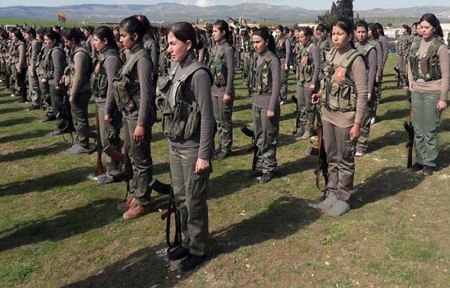
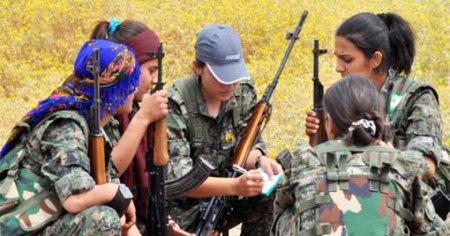
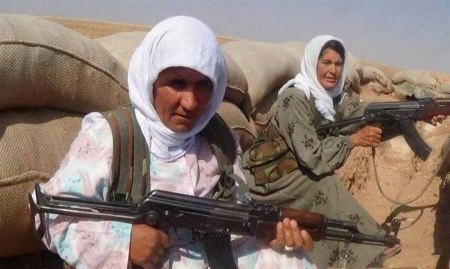
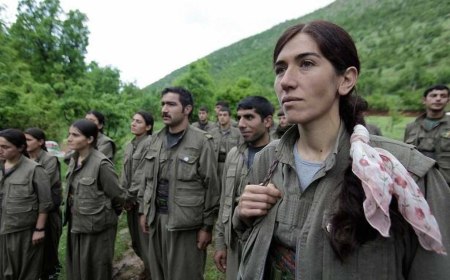
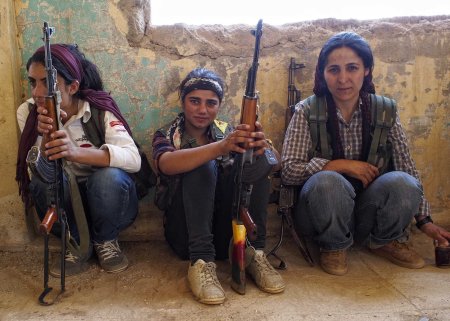
Keine Kommentare:
Kommentar veröffentlichen